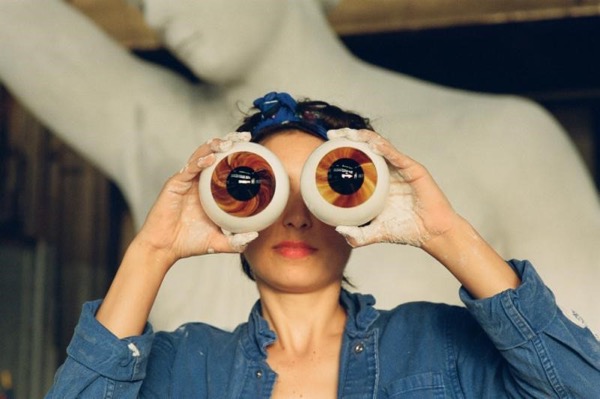Prune Nourry is a multi-disciplinary artist interested in science and anthropology. She combines sculpture, installation, performance, video, and photography in her work. Nourry has gained international recognition for her long-term projects, such as the army of Terracotta Daughters, inspired by the Xi’an terracotta warriors, and was recently rewarded with a retrospective show at the Guimet Museum in Paris across its entire building, an honor never before bestowed on a living artist. “Serendipity” is her feature directorial debut.
“Serendipity” will premiere at the 2019 Berlin International Film Festival today, February 12.
W&H: Describe the film for us in your own words.
PN: It’s the story of an artist. I’m saying an artist and not me for a reason. Before my illness, I thought my work wasn’t related to me — that I was a kind of scientist-artist. Finally, life taught me that an art and being an artist can only be subjective.
W&H: What drew you to this story?
PN: I was diagnosed with breast cancer after more than 10 years of exploring questions in my work around fertility and assisted procreation. One of my first artworks was a breast-udder. And one of my first performances was what I called “The Procreative Dinner,” where I was serving guests frozen eggs as a starter, and my nipple molded in almond paste as a dessert.
After finding out that I was ill, freezing my eggs was the first step I had to go through before chemo, along with many other strangely serendipitous links between my previous works and what I was going through.
W&H: What do you want people to think about when they are leaving the theater?
PN: “Serendipity” is a mysterious word that carries the idea of chance and hazard, but also how your intuition takes that notion of coincidence to transform it into something. I hope this movie will bring hope, and that it will inspire young women to practice palpation on their breasts regularly. This is the safest and least invasive way to do a regular surveillance. I was only 31 when I discovered I had a tumor, and my gynecologist discovered it by palpation.
W&H: What was the biggest challenge in making the film?
PN: I’d say the biggest challenge was to accept and to let go. For the first time, the project is my story, whereas I’m generally rather reserved. But here I thought — and hoped — it could be useful to other women in one way or another if they heard the story from me.
Another challenge, more for the scenarist, Alastair Siddons, and the editor, Paul Carlin, was the sometimes limited nature of the archival material from my past that we had to tell the story.
W&H: How did you get your film funded? Share some insights into how you got the film made.
PN: “Serendipity” was financed two different ways. Firstly, through the selling of my artwork to collectors over the years, as art and documentation were intimately linked — documenting all my projects and performances through video is a very important part of my work as a visual artist and filmmaker.
The other way of financing was thanks to a dear friend of mine who knew and trusted my work. He had just started to work for a small foundation who finance projects by artists/filmmakers, and I loved their relationship to the artist. They insist on the importance of social impact of the projects they choose while giving the artist/filmmaker total freedom and final cut, which puts you in a special space with freedom to create.
W&H: What inspired you to become a filmmaker?
PN: It’s really that need to document and archive all the places and art projects I was going through. As a collector of images and ephemeral moments. I then started to edit some shorts by myself on Final Cut. I was also playing with the image while re-projecting it on material — such as milk, milk powder, and clay — with what I call the “sculpted images.”
W&H: What’s the best and worst advice you’ve received?
PN: The best advice was from Darren Aronofsky, my executive producer. When I learned about the illness, he told me to take a camera and film myself while going through all the steps, and said, “You never know as an artist what you can sculpt with that material.”
While I was going through chemo and desperate to start making the movie in earnest at the same time, my friend Alastair Siddons, producer and writer of the film, said, “Give it some time. You need longer to reflect on this.” He was right.
I forget the worst advice.
W&H: What advice do you have for other female directors?
PN: Action brings action! Think but don’t overthink! Do more by yourself with your friends, and surround yourself with people you trust and that trust in you! Having the right team is the real magic — and that’s the way to enjoy the process!
W&H: Name your favorite woman-directed film and why.
PN: I love “Cameraperson” by Kirsten Johnson! It was a real inspiration, as was Laurie Anderson’s film about the death of her dog, “Heart of a Dog.”
W&H: It’s been a little over a year since the reckoning in Hollywood and the global film industry began. What differences have you noticed since the #MeToo and #TimesUp movements launched?
PN: It’s a very important and much-needed revolution! Every revolution has its collateral damages — see the French revolution and all the heads cut! But we need to keep up the fight against fear and discrimination in general. Give a voice, especially through the arts, to the women — the majority who are considered a minority — and all minorities as well!







